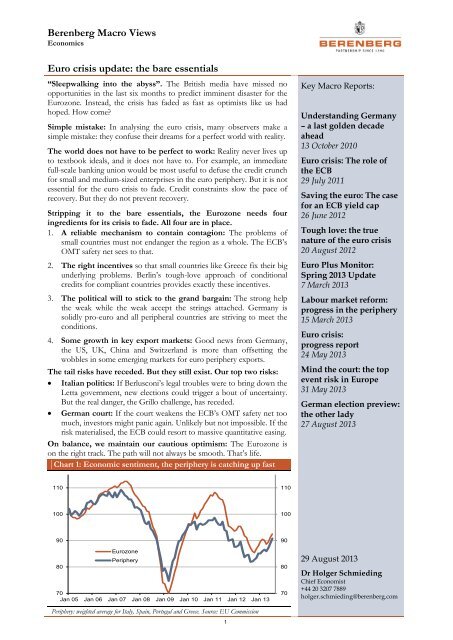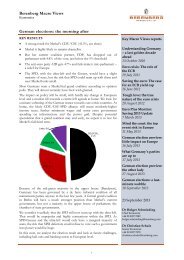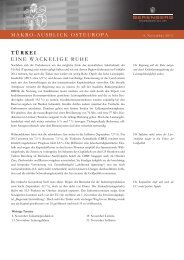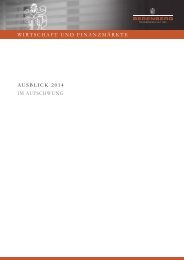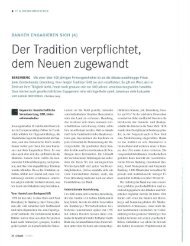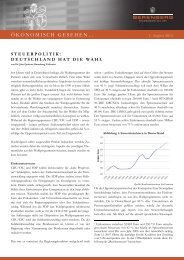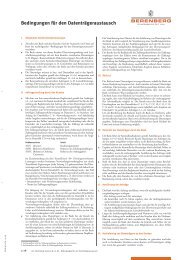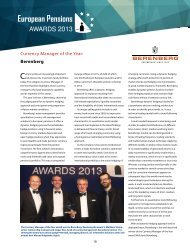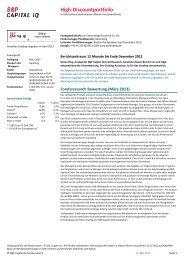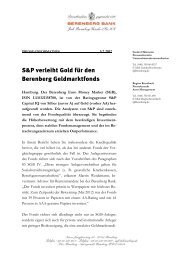full report and disclosures - Berenberg Bank
full report and disclosures - Berenberg Bank
full report and disclosures - Berenberg Bank
You also want an ePaper? Increase the reach of your titles
YUMPU automatically turns print PDFs into web optimized ePapers that Google loves.
<strong>Berenberg</strong> Macro Views<br />
Economics<br />
Euro crisis update: the bare essentials<br />
“Sleepwalking into the abyss”. The British media have missed no<br />
opportunities in the last six months to predict imminent disaster for the<br />
Eurozone. Instead, the crisis has faded as fast as optimists like us had<br />
hoped. How come?<br />
Simple mistake: In analysing the euro crisis, many observers make a<br />
simple mistake: they confuse their dreams for a perfect world with reality.<br />
The world does not have to be perfect to work: Reality never lives up<br />
to textbook ideals, <strong>and</strong> it does not have to. For example, an immediate<br />
<strong>full</strong>-scale banking union would be most useful to defuse the credit crunch<br />
for small <strong>and</strong> medium-sized enterprises in the euro periphery. But it is not<br />
essential for the euro crisis to fade. Credit constraints slow the pace of<br />
recovery. But they do not prevent recovery.<br />
Stripping it to the bare essentials, the Eurozone needs four<br />
ingredients for its crisis to fade. All four are in place.<br />
1. A reliable mechanism to contain contagion: The problems of<br />
small countries must not endanger the region as a whole. The ECB’s<br />
OMT safety net sees to that.<br />
2. The right incentives so that small countries like Greece fix their big<br />
underlying problems. Berlin’s tough-love approach of conditional<br />
credits for compliant countries provides exactly these incentives.<br />
3. The political will to stick to the gr<strong>and</strong> bargain: The strong help<br />
the weak while the weak accept the strings attached. Germany is<br />
solidly pro-euro <strong>and</strong> all peripheral countries are striving to meet the<br />
conditions.<br />
4. Some growth in key export markets: Good news from Germany,<br />
the US, UK, China <strong>and</strong> Switzerl<strong>and</strong> is more than offsetting the<br />
wobbles in some emerging markets for euro periphery exports.<br />
The tail risks have receded. But they still exist. Our top two risks:<br />
Italian politics: If Berlusconi’s legal troubles were to bring down the<br />
Letta government, new elections could trigger a bout of uncertainty.<br />
But the real danger, the Grillo challenge, has receded.<br />
German court: If the court weakens the ECB’s OMT safety net too<br />
much, investors might panic again. Unlikely but not impossible. If the<br />
risk materialised, the ECB could resort to massive quantitative easing.<br />
On balance, we maintain our cautious optimism: The Eurozone is<br />
on the right track. The path will not always be smooth. That’s life.<br />
Chart 1: Economic sentiment, the periphery is catching up fast<br />
Key Macro Reports:<br />
Underst<strong>and</strong>ing Germany<br />
– a last golden decade<br />
ahead<br />
13 October 2010<br />
Euro crisis: The role of<br />
the ECB<br />
29 July 2011<br />
Saving the euro: The case<br />
for an ECB yield cap<br />
26 June 2012<br />
Tough love: the true<br />
nature of the euro crisis<br />
20 August 2012<br />
Euro Plus Monitor:<br />
Spring 2013 Update<br />
7 March 2013<br />
Labour market reform:<br />
progress in the periphery<br />
15 March 2013<br />
Euro crisis:<br />
progress <strong>report</strong><br />
24 May 2013<br />
Mind the court: the top<br />
event risk in Europe<br />
31 May 2013<br />
German election preview:<br />
the other lady<br />
27 August 2013<br />
110<br />
110<br />
100<br />
100<br />
90<br />
Eurozone<br />
Periphery<br />
80<br />
70<br />
Jan 05 Jan 06 Jan 07 Jan 08 Jan 09 Jan 10 Jan 11 Jan 12 Jan 13<br />
Periphery: weighted average for Italy, Spain, Portugal <strong>and</strong> Greece. Source: EU Commission<br />
1<br />
90<br />
80<br />
70<br />
29 August 2013<br />
Dr Holger Schmieding<br />
Chief Economist<br />
+44 20 3207 7889<br />
holger.schmieding@berenberg.com
<strong>Berenberg</strong> Macro Views<br />
Economics<br />
Confusing dreams <strong>and</strong> reality<br />
“Sleepwalking into the abyss” or “the euro crisis is back”. For the last six months,<br />
British media including The Economist have missed no opportunity to predict<br />
imminent disaster for the Eurozone. So far, however, the crisis monster has failed to<br />
rear its head again. With a gradual fading of market tensions, the Eurozone economy<br />
has started to recover. How come?<br />
In analysing the euro crisis, many observers make a simple mistake: they conflate<br />
their dreams for a perfect world with reality.<br />
The world does not have to be perfect in order to work. For example, Germany<br />
would arguably be much better off if it had a simple flat tax <strong>and</strong> a deregulated labour<br />
market. But in real life, a ridiculously complex tax system <strong>and</strong> an overregulated labour<br />
market have not prevented Germany from turning itself into the economic<br />
powerhouse of Europe. In the same vein, most Britons would live a more<br />
comfortable life if the country had a properly functioning housing market. But in real<br />
life, Britain’s absurd restrictions on the supply of new houses are not preventing the<br />
country from enjoying a credit-fuelled economic upturn.<br />
The same logic holds for the euro crisis. Many observers believe that the region<br />
needs <strong>full</strong> political union, <strong>full</strong> fiscal union, an immediate banking union <strong>and</strong> a <strong>full</strong><br />
German/ECB guarantee for sovereign debt or the realisation of some other<br />
pipedream to get out of its crisis. Some of the arguments such observers make are<br />
not wrong. Yes, some kinds of financial tensions could be contained more reliably by<br />
a <strong>full</strong>-scale mutualisation of public debt or other variants of fiscal or even political<br />
union. And yes, an immediate banking union or any other way to end the credit<br />
crunch for small <strong>and</strong> medium-sized enterprises in parts of the euro periphery in one<br />
fell swoop might be quite helpful. But discussing what may or may not be desirable is<br />
very different from analysing what is strictly necessary for the euro crisis to fade.<br />
Sleepwalking into the<br />
abyss? Not really<br />
You don’t have to be<br />
perfect to get some growth<br />
Desirable does not equal<br />
essential<br />
The bare essentials<br />
Stripping it down to the bare essentials, the Eurozone needs four ingredients<br />
for its crisis to fade. All four are in place.<br />
1. A reliable mechanism to contain contagion: The problems of small countries<br />
must not endanger the region as a whole. Since Draghi’s announcement on 26<br />
July 2012 that the second most powerful economic institution in the world, the<br />
European Central <strong>Bank</strong>, would not commit suicide but would instead do all it<br />
takes to preserve the euro <strong>and</strong> its own existence, this ingredient is present.<br />
2. The right incentives so that countries like Greece fix their underlying<br />
problems. With the tough-love approach pursued by Germany <strong>and</strong> the ECB, this<br />
ingredient is there as well: Europe helps nations such as Greece or Irel<strong>and</strong> with<br />
serious amounts of money if the recipients submit to harsh reform conditions. 1<br />
Despite occasional hiccups, the reform process is well entrenched <strong>and</strong> well<br />
advanced. 2<br />
Contagion control in place<br />
Crisis countries are<br />
adjusting<br />
1 We explain this approach in detail in Tough Love: the true nature of the euro crisis, <strong>Berenberg</strong>, 20 August<br />
2012.<br />
2 See for example our Euro Plus Monitor, Spring 2013 Update, <strong>Berenberg</strong> <strong>and</strong> Lisbon Council, 7 March 2013.<br />
2
<strong>Berenberg</strong> Macro Views<br />
Economics<br />
3. The political will to stick to the gr<strong>and</strong> bargain: The strong help the weak<br />
while the weak accept the strings attached. All German mainstream political<br />
parties back Chancellor Merkel’s euro policies. No realistic result of the German<br />
election on 22 September 2013 could lead to Germany turning its back on its<br />
European partners. 3 At the periphery, the will to do what it takes to stay part of<br />
the euro family has survived numerous challenges including elections <strong>and</strong><br />
changes in government in Greece, Irel<strong>and</strong>, Portugal, Italy <strong>and</strong> Spain.<br />
4. Some growth in key export markets: To export their way out of their<br />
domestic adjustment recessions, the euro peripheral countries need some<br />
increase in global dem<strong>and</strong> <strong>and</strong> in core European domestic dem<strong>and</strong>. So far,<br />
external dem<strong>and</strong> has proved suitably resilient. For the euro periphery, good news<br />
from Germany, the US, UK, China <strong>and</strong> Switzerl<strong>and</strong> is more than offsetting the<br />
wobbles in a number of emerging markets.<br />
Of course, past performance provides no guarantees for the future. But it does hold<br />
lessons. Eurosceptics <strong>and</strong> the readers of those British media who know very little<br />
about what is really happening on the continent underestimate at their own peril the<br />
capacity of the Eurozone to contain <strong>and</strong> overcome its crisis.<br />
The political will has<br />
survived various elections<br />
Key export markets are<br />
growing<br />
Risks are receding as economies turn the corner<br />
Serious risks remain, including the risks that (i) the German Constitutional Court<br />
could constrain the ECB’s OMT safety in a way that renders it ineffective or that (ii)<br />
potential new elections in Italy or Greece could sweep irresponsible mavericks like<br />
Beppe Grillo or Alexis Tsipras into power. But with the peripheral economies<br />
starting to stabilise <strong>and</strong> the rise in unemployment starting to fizzle out, the<br />
vulnerability of the Eurozone to contagion hazards <strong>and</strong> the political challenges in<br />
peripheral economies are now less serious than they used to be.<br />
It could still go wrong. But it would now take a bigger shock to trigger massive new<br />
tensions. Also, the probability that such a shock will occur has receded. In the next<br />
two sections, we take a closer look at the two major risks – the German<br />
Constitutional Court <strong>and</strong> Italian politics.<br />
Of course. Life is <strong>full</strong> of<br />
risks<br />
It would no take a bigger<br />
shock to trigger a new<br />
wave of crisis<br />
Risk 1: Italian politics<br />
In early 2013, Italian politics topped our list of what could still go wrong in the<br />
Eurozone. The risk receded when Italy’s President Napolitano (our favourite excommunist)<br />
forced Italy’s centre-left <strong>and</strong> centre-right into an uneasy coalition in early<br />
April after the inconclusive election of late February. The risk could flare up again if<br />
the centre-left votes to strip the centre-right leader, the convicted tax fraudster<br />
Berlusconi, of his Senate seat <strong>and</strong> the centre-right then withdraws from government.<br />
The Senate is scheduled to vote on 9 September, although the vote might still be<br />
delayed.<br />
New Italian elections would create new uncertainty. That would be awkward. But as<br />
we argued in March, the later such new elections come, the less disruptive they would<br />
Thank you, Mr President<br />
Less concerned than<br />
3 See our German election preview: the other lady, <strong>Berenberg</strong>, 27 August 2013.<br />
3
<strong>Berenberg</strong> Macro Views<br />
Economics<br />
probably be. We are less concerned about political instability in Italy than we were in<br />
early 2013.<br />
before<br />
<br />
<br />
Logic suggests that Berlusconi, while playing hardball to get as much out of his<br />
centre-left coalition partner as possible, does not have an incentive to go for new<br />
elections. If he lost such elections, as he probably would, his chances of getting<br />
any kind of leniency or even pardon from a new Italian government <strong>and</strong>/or the<br />
Italian president would probably be zero. His best chance to stay out of jail, or at<br />
least avoid lengthy house arrest, would be to stay on speaking terms with<br />
President Napolitano <strong>and</strong> the centre-left rather than throwing the country into<br />
new turmoil in a rash response to losing his Senate seat.<br />
President Napolitano has shown a steely resolve to keep Italy out of trouble. If<br />
he feared that the uncertainty created by new elections could disrupt Italy’s<br />
economic healing process, he might just ask Prime Minister Letta to stay on as<br />
interim prime minister for an extended period until it were safe to call new<br />
elections or until a post-Berlusconi centre-right sorted itself out <strong>and</strong> joined the<br />
government again. In the meantime, a centre-left interim government would have<br />
a majority in Italy’s House of Representatives but not in the Senate. In such<br />
circumstances, Italy might not get much done. But neither would it provoke a<br />
disaster. After all, US President Obama <strong>and</strong> Germany’s Chancellor Merkel are in<br />
the same position: both lack a majority in their upper houses <strong>and</strong> cannot get<br />
major laws passed unless they strike specific deals with the opposition.<br />
Berlusconi: how best to<br />
stay out of jail?<br />
A caretaker government if<br />
need be?<br />
<br />
New elections in Italy in late 2013 or early 2014 would be much less of a risk<br />
than they would have been in May or June. Memories of the savage Monti tax<br />
hikes of 2012 are now less raw. Italian consumer confidence <strong>and</strong> other leading<br />
economic indicators have recovered. Beppo Grillo has shown himself to be a<br />
dictatorial leader of his “Five Star” movement, alienating some erstwhile<br />
supporters. Opinion polls (Chart 2) suggest that new elections would now be a<br />
straight race between the centre-left <strong>and</strong> centre-right with both sides, on balance,<br />
likely to pursue fairly sensible <strong>and</strong> pro-euro policies if they won.<br />
Chart 2: Centre-left up, Grillo down: Italian opinion polls<br />
40%<br />
New elections in Italy<br />
would be awkward but<br />
less dangerous than before<br />
35%<br />
30%<br />
25%<br />
20%<br />
15%<br />
10%<br />
5%<br />
Berlusconi coalition<br />
Centre-left coalition<br />
Monti<br />
Grillo<br />
Other<br />
Grillo is trailing far<br />
behind the mainstream<br />
0%<br />
Feb 2013 Mrz 2013 Apr 2013 Mai 2013 Jun 2013 Jul 2013 Aug 2013<br />
Average of the five most recent opinion polls each week. Source: Ipsos, Coesis, IPR, EMG, Peipoli, LORIEN,<br />
Euromedia, SWG, Tecne<br />
4
<strong>Berenberg</strong> Macro Views<br />
Economics<br />
Risk 2: German court<br />
Some time after the German elections on 22 September 2013, the German<br />
Constitutional Court will probably give its verdict on the ECB’s OMT programme.<br />
Judging by the tone of the court hearings on 12 <strong>and</strong> 13 June 2013, the judges are no<br />
fans of the ECB promise to buy sovereign bonds of peripheral countries in the event<br />
of renewed market turmoil, to put it mildly. But Berlin sees the ECB’s safety net as<br />
essential to contain the euro crisis. The court has no tradition of contradicting Berlin<br />
on key issues of Germany foreign policy. And whatever their misgivings about the<br />
OMT, the judges probably have no desire to trigger grave financial turmoil.<br />
We thus expect the judges to say that the OMT is legal under the German<br />
constitution <strong>and</strong> the German interpretation of the Maastricht treaty if the OMT<br />
respects some constraints which the judges will outline.<br />
The genuine risk we see is that the judges, in trying to constrain the OMT, may do so<br />
in a way that renders it ineffective. In markets, perceptions matter even more than<br />
substance. And the judges are not financial experts. If markets conclude after the<br />
verdict that a constrained OMT is no longer a reliable shield against contagion risks,<br />
contagion might again spread like wildfire in the Eurozone, sending financial markets<br />
<strong>and</strong> leading economic indicators into a tailspin.<br />
We consider this unlikely. But we cannot rule it out. If the risk were to materialise,<br />
the ECB would need to find other ways to make good on its vow to do all it takes to<br />
preserve the euro. As a first reaction, the ECB would probably cut rates by 25bp <strong>and</strong><br />
remind markets that the bank has other powerful instruments including outright<br />
quantitative easing at its disposal. If that were not enough, the ECB would probably<br />
start a major programme of quantitative easing with outright purchases of sovereign<br />
bonds of all member countries above a certain ratings threshold. The threshold<br />
would likely be set to include Italian <strong>and</strong> Spanish bonds but not those of Greece or<br />
Portugal. Massive quantitative easing would probably calm markets again. The risk of<br />
renewed recession in the wake of escalating market turmoil would give the ECB the<br />
justification to act so decisively.<br />
It would be one of the ironies of history. If the German Constitutional Court rules<br />
against the ECB promise to buy sovereign bonds of some countries that meet certain<br />
conditions, the result could be massive <strong>and</strong> unconditional purchases of sovereign<br />
bonds of almost all Eurozone countries. That would be unfortunate. But it would not<br />
spell disaster.<br />
The judges have no<br />
tradition of upsetting<br />
Berlin on key issues of<br />
foreign policy<br />
Expect the judges to<br />
constrain the OMT<br />
But what if these<br />
constraints render the<br />
OMT ineffective?<br />
If worst came to worst, the<br />
ECB would not shy away<br />
from quantitative easing<br />
to end a market panic<br />
An irony of history?<br />
The end of the crisis? Not yet, but maybe soon<br />
At the start of 2013, we had a clear idea of what we wanted to do at the end of the<br />
year: we wanted to write a big <strong>report</strong> declaring the end of the euro crisis. As we<br />
discussed in March, the biggest risk to our plan remains that we may have missed the<br />
boat. Judging by the level of market tensions, the euro crisis was largely over by<br />
February 2013. But we first need to actually see the economic rebound in the euro<br />
periphery which leading indicators are now flagging, <strong>and</strong> we need to get beyond the<br />
German court verdict, before we can judge whether or not the crisis is over for good.<br />
Until then, we still face the risk that a new but probably less vicious wave of crisis<br />
could hit the Eurozone before we can sound the all-clear.<br />
A merry Christmas?<br />
5
<strong>Berenberg</strong> Macro Views<br />
Economics<br />
Disclaimer<br />
This document was compiled by the above mentioned authors of the economics department of Joh.<br />
<strong>Berenberg</strong>, Gossler & Co. KG (hereinafter referred to as “the <strong>Bank</strong>”),. The <strong>Bank</strong> has made any effort to<br />
care<strong>full</strong>y research <strong>and</strong> process all information. The information has been obtained from sources which we<br />
believe to be reliable such as, for example, Thomson Reuters, Bloomberg <strong>and</strong> the relevant specialised press.<br />
However, we do not assume liability for the correctness <strong>and</strong> completeness of all information given. The<br />
provided information has not been checked by a third party, especially an independent auditing firm. We<br />
explicitly point to the stated date of preparation. The information given can become incorrect due to passage<br />
of time <strong>and</strong>/or as a result of legal, political, economic or other changes. We do not assume responsibility to<br />
indicate such changes <strong>and</strong>/or to publish an updated document. The forecasts contained in this document or<br />
other statements on rates of return, capital gains or other accession are the personal opinion of the author<br />
<strong>and</strong> we do not assume liability for the realisation of these.<br />
This document is only for information purposes. It does not constitute a financial analysis within the meaning<br />
of § 34b or § 31 Subs. 2 of the German Securities Trading Act (Wertpapierh<strong>and</strong>elsgesetz), no investment<br />
advice or recommendation to buy financial instruments. It does not replace consulting regarding legal, tax or<br />
financial matters.<br />
Remarks regarding foreign investors<br />
The preparation of this document is subject to regulation by German law. The distribution of this document<br />
in other jurisdictions may be restricted by law, <strong>and</strong> persons, into whose possession this document comes,<br />
should inform themselves about, <strong>and</strong> observe, any such restrictions.<br />
United Kingdom<br />
This document is meant exclusively for institutional investors <strong>and</strong> market professionals, but not for private<br />
customers. It is not for distribution to or the use of private investors or private customers.<br />
United States of America<br />
This document has been prepared exclusively by Joh. <strong>Berenberg</strong>, Gossler & Co. KG. Although <strong>Berenberg</strong><br />
Capital Markets LLC, an affiliate of the <strong>Bank</strong> <strong>and</strong> registered US broker-dealer, distributes this document to<br />
certain customers, <strong>Berenberg</strong> Capital Markets LLC does not provide input into its contents, nor does this<br />
document constitute research of <strong>Berenberg</strong> Capital Markets LLC. In addition, this document is meant<br />
exclusively for institutional investors <strong>and</strong> market professionals, but not for private customers. It is not for<br />
distribution to or the use of private investors or private customers.<br />
This document is classified as objective for the purposes of FINRA rules. Please contact <strong>Berenberg</strong> Capital<br />
Markets LLC (+1 617.292.8200), if you require additional information.<br />
Copyright<br />
The <strong>Bank</strong> reserves all the rights in this document. No part of the document or its content may be rewritten,<br />
copied, photocopied or duplicated in any form by any means or redistributed without the <strong>Bank</strong>’s prior written<br />
consent.<br />
© August 2013 Joh. <strong>Berenberg</strong>, Gossler & Co. KG<br />
6
<strong>Berenberg</strong> Macro Views<br />
Economics<br />
Contacts: Investment <strong>Bank</strong>ing<br />
Equity Research<br />
E-mail: firstname.lastname@berenberg.com; Internet www.berenberg.com<br />
AUTOMOTIVES DIVERSIFIED FINANCIALS MID-CAP GENERAL<br />
Adam Hull +44 (0) 20 3465 2749 Pras Jeyan<strong>and</strong>han +44 (0) 20 3207 7899 Gunnar Cohrs +44 (0) 20 3207 7894<br />
Roman Mathyssek +44 (0) 20 3207 7841 Bjoern Lippe +44 (0) 20 3207 7845<br />
ECONOMICS Anna Patrice +44 (0) 20 3207 7863<br />
BANKS Dr. Holger Schmieding +44 (0) 20 3207 7889 Stanislaus von Thurn und Taxis +44 (0) 20 3465 2631<br />
Nick Anderson +44 (0) 20 3207 7838 Dr. Christian Schulz +44 (0) 20 3207 7878<br />
James Chappell +44 (0) 20 3207 7844 Robert Wood +44 (0) 20 3207 7822 OIL & GAS<br />
Andrew Lowe +44 (0) 20 3465 2743 Asad Farid +44 (0) 20 3207 7932<br />
Eoin Mullany +44 (0) 20 3207 7854 FOOD MANUFACTURING Jaideep P<strong>and</strong>ya +44 (0) 20 3207 7890<br />
Eleni Papoula +44 (0) 20 3465 2741 Fintan Ryan +44 (0) 20 3465 2748<br />
Michelle Wilson +44 (0) 20 3465 2663 Andrew Steele +44 (0) 20 3207 7926 REAL ESTATE<br />
James Targett +44 (0) 20 3207 7873 Kai Klose +44 (0) 20 3207 7888<br />
BEVERAGES Estelle Weingrod +44 (0) 20 3207 7931<br />
Philip Morrisey +44 (0) 20 3207 7892 GENERAL RETAIL & LUXURY GOODS<br />
Josh Puddle +44 (0) 20 3207 7881 Bassel Choughari +44 (0) 20 3465 2675 TECHNOLOGY<br />
John Guy +44 (0) 20 3465 2674 Adnaan Ahmad +44 (0) 20 3207 7851<br />
BUSINESS SERVICES Sebastian Grabert +44 (0) 20 3207 7834<br />
William Foggon +44 (0) 20 3207 7882 HEALTHCARE Daud Khan +44 (0) 20 3465 2638<br />
Simon Mezzanotte +44 (0) 20 3207 7917 Scott Bardo +44 (0) 20 3207 7869 Ali Khwaja +44 (0) 20 3207 7852<br />
Arash Roshan Zamir +44 (0) 20 3465 2636 Alistair Campbell +44 (0) 20 3207 7876 Tammy Qiu +44 (0) 20 3465 2673<br />
Konrad Zomer +44 (0) 20 3207 7920 Charles Cooper +44 (0) 20 3465 2637<br />
Graham Doyle +44 (0) 20 3465 2634 TELECOMMUNICATIONS<br />
CAPITAL GOODS Louise Hinds +44 (0) 20 3465 2747 Wassil El Hebil +44 (0) 20 3207 7862<br />
Frederik Bitter +44 (0) 20 3207 7916 Tom Jones +44 (0) 20 3207 7877 Usman Ghazi +44 (0) 20 3207 7824<br />
Benjamin Glaeser +44 (0) 20 3207 7918 Stuart Gordon +44 (0) 20 3207 7858<br />
William Mackie +44 (0) 20 3207 7837 HOUSEHOLD & PERSONAL CARE Laura Janssens +44 (0) 20 3465 2639<br />
Margaret Paxton +44 (0) 20 3207 7934 Jade Barkett +44 (0) 20 3207 7895 Paul Marsch +44 (0) 20 3207 7857<br />
Alex<strong>and</strong>er Virgo +44 (0) 20 3207 7856 Seth Peterson +44 (0) 20 3207 7891 Barry Zeitoune +44 (0) 20 3207 7859<br />
Felix Wienen +44 (0) 20 3207 7915<br />
INSURANCE<br />
TOBACCO<br />
CHEMICALS Tom Carstairs +44 (0) 20 3207 7823 Erik Bloomquist +44 (0) 20 3207 7870<br />
John Philipp Klein +44 (0) 20 3207 7930 Peter Eliot +44 (0) 20 3207 7880 Kate Kalashnikova +44 (0) 20 3465 2665<br />
Evgenia Molotova +44 (0) 20 3465 2664 Kai Mueller +44 (0) 20 3465 2681<br />
Jaideep P<strong>and</strong>ya +44 (0) 20 3207 7890 Matthew Preston +44 (0) 20 3207 7913 UTILITIES<br />
Sami Taipalus +44 (0) 20 3207 7866 Robert Chantry +44 (0) 20 3207 7861<br />
CONSTRUCTION Andrew Fisher +44 (0) 20 3207 7937<br />
Barnaby Benedict +44 (0) 20 3465 2669 MEDIA Oliver Salvesen +44 (0) 20 3207 7818<br />
Chris Moore +44 (0) 20 3465 2737 Robert Berg +44 (0) 20 3465 2680 Lawson Steele +44 (0) 20 3207 7887<br />
Robert Muir +44 (0) 20 3207 7860 Emma Coulby +44 (0) 20 3207 7821<br />
Michael Watts +44 (0) 20 3207 7928 Laura Janssens +44 (0) 20 3465 2639<br />
Sarah Simon +44 (0) 20 3207 7830<br />
Equity Sales<br />
E-mail: firstname.lastname@berenberg.com; Internet www.berenberg.com<br />
Specialist Sales Sales Sales<br />
BANKS LONDON SOVEREIGN WEALTH FUNDS<br />
Iro Papadopoulou +44 (0) 20 3207 7924 John von <strong>Berenberg</strong>-Consbruch +44 (0) 20 3207 7805 Max von Doetinchem +44 (0) 20 3207 7826<br />
Matt Chawner +44 (0) 20 3207 7847<br />
CONSUMER Toby Flaux +44 (0) 20 3465 2745 Sales Trading<br />
Rupert Trotter +44 (0) 20 3207 7815 Karl Hancock +44 (0) 20 3207 7803 HAMBURG<br />
Sean Heath +44 (0) 20 3465 2742 Paul Dontenwill +49 (0) 40 350 60 563<br />
INSURANCE James Hipkiss +44 (0) 20 3465 2620 Alex<strong>and</strong>er Heinz +49 (0) 40 350 60 359<br />
Trevor Moss +44 (0) 20 3207 7893 David Hogg +44 (0) 20 3465 2628 Gregor Labahn +49 (0) 40 350 60 571<br />
Zubin Hubner +44 (0) 20 3207 7885 Chris McKe<strong>and</strong> +49 (0) 40 350 60 798<br />
HEALTHCARE Ben Hutton +44 (0) 20 3207 7804 Fin Schaffer +49 (0) 40 350 60 596<br />
Frazer Hall +44 (0) 20 3207 7875 James Matthews +44 (0) 20 3207 7807 Lars Schwartau +49 (0) 40 350 60 450<br />
David Mortlock +44 (0) 20 3207 7850 Marvin Schweden +49 (0) 40 350 60 576<br />
INDUSTRIALS Peter Nichols +44 (0) 20 3207 7810 Tim Storm +49 (0) 40 350 60 415<br />
Chris Armstrong +44 (0) 20 3207 7809 Richard Payman +44 (0) 20 3207 7825 Philipp Wiechmann +49 (0) 40 350 60 346<br />
Kaj Alftan +44 (0) 20 3207 7879 George Smibert +44 (0) 20 3207 7911<br />
Anita Surana +44 (0) 20 3207 7855 LONDON<br />
MEDIA Paul Walker +44 (0) 20 3465 2632 Mike Berry +44 (0) 20 3465 2755<br />
Julia Thannheiser +44 (0) 20 3465 2676 Stewart Cook +44 (0) 20 3465 2752<br />
FRANKFURT Simon Messman +44 (0) 20 3465 2754<br />
TECHNOLOGY Michael Brauburger +49 (0) 69 91 30 90 741 Stephen O'Donohoe +44 (0) 20 3465 2753<br />
Jean Beaubois +44 (0) 20 3207 7835 Nina Buechs +49 (0) 69 91 30 90 735<br />
André Grosskurth +49 (0) 69 91 30 90 734 PARIS<br />
TELECOMMUNICATIONS Boris Koegel +49 (0) 69 91 30 90 740 Sylvain Granjoux +33 (0) 1 5844 9509<br />
Julia Thannheiser +44 (0) 20 3465 2676 Joerg Wenzel +49 (0) 69 91 30 90 743<br />
CORPORATE ACCESS<br />
UTILITIES PARIS Patricia Nehring +44 (0) 20 3207 7811<br />
Benita Barretto +44 (0) 20 3207 7829 Miel Bakker (London) +44 (0) 20 3207 7808<br />
Dalila Farigoule +33 (0) 1 5844 9510 CRM<br />
Sales Clémence La Clavière-Peyraud +33 (0) 1 5844 9521 Greg Swallow +44 (0) 20 3207 7833<br />
BENELUX Olivier Thibert +33 (0) 1 5844 9512 Laura Cooper +44 (0) 20 3207 7806<br />
Miel Bakker (London) +44 (0) 20 3207 7808<br />
Susette Mantzel (Hamburg) +49 (0) 40 350 60 694 ZURICH EVENTS<br />
Alex<strong>and</strong>er Wace (London) +44 (0) 20 3465 2670 Stephan Hofer +41 (0) 44 283 2029 Natalie Meech +44 (0) 20 3207 7831<br />
Carsten Kinder +41 (0) 44 283 2024 Charlotte Kilby +44 (0) 20 3207 7832<br />
SCANDINAVIA Gianni Lavigna +41 (0) 44 283 2038 Charlotte Reeves +44 (0) 20 3465 2671<br />
Ronald Bernette (London) +44 (0) 20 3207 7828 James Nettleton +41 (0) 44 283 2026 Sarah Weyman +44 (0) 20 3207 7801<br />
Marco Weiss (Hamburg) +49 (0) 40 350 60 719 Benjamin Stillfried +41 (0) 44 283 2033 Hannah Whitehead +44 (0) 20 3207 7922<br />
US Sales<br />
E-mail: firstname.lastname@berenberg-us.com<br />
BERENBERG CAPITAL MARKETS LLC<br />
Member FINRA & SIPC<br />
Andrew Holder +1 (617) 292 8222 Julie Doherty +1 (617) 292 8228 Jonathan Paterson +1 (646) 445 7212<br />
Colin Andrade +1 (617) 292 8230 Kelleigh Faldi +1 (617) 292 8288 Jonathan Saxon +1 (646) 445 7202<br />
Cathal Carroll +1 (646) 445 7206 Emily Mouret +1 (646) 445 7204<br />
Burr Clark +1 (617) 292 8282 Kieran O'Sullivan +1 (617) 292 8292<br />
7


